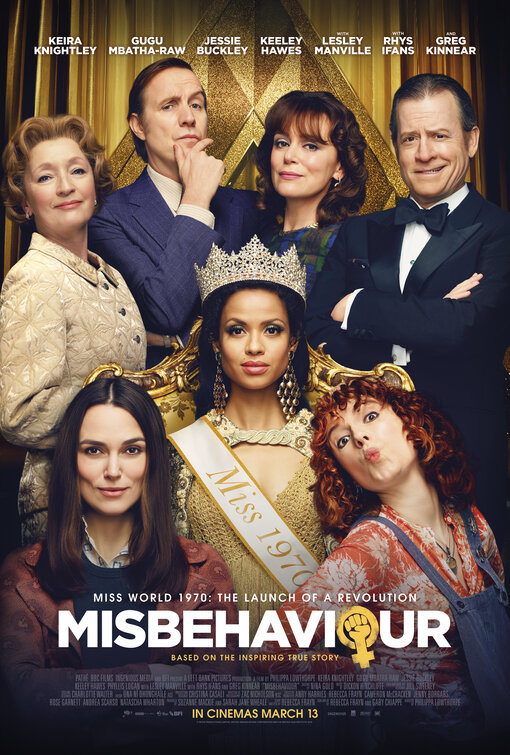
These days, you know a controversial radical has been been awarded the mainstream stamp of approval if Keira Knightly is cast as that person in a handsomely mounted biopic. In November 1970, a group of feminist activists flour-bombed the stage at the Royal Albert Hall to proclaim their dissatisfaction with the Miss World Beauty contest. That’s the inspiration for this well-meaning but passive drama highlighting a host of various women ….oh and uh…Bob Hope……..associated with the event. The comedic icon hosted the highly watched event. Its viewership comprised of over 100 million people across the globe. Filmmaker Philippa Lowthorpe (BBC TV’s Call the Midwife, UK miniseries Three Girls) is the first [and only] woman to win a BAFTA for directing. It’s rather fitting that someone with that distinction should helm a production such as this. The largely female creative team behind the camera includes producers Suzanne Mackie & Sarah Jane Wheale along with a screenplay by Rebecca Flynn & Gaby Chiappe.
Misbehaviour is an account featuring an ensemble that attempts to detail several stories. The chronicle wants to be both a takedown of pageants that demean women while also uplifting those very same institutions as an establishment that elevates underrepresented individuals. The confusing point of view inexplicably changes over the course of this saga. However, if I had to cite a driving focus I’d say it was Sally Alexander. She’s portrayed by the aforementioned Keira Knightley who is making a habit of playing crusaders for the cultural good as of late. Sally is a history major at Ruskin College, Oxford and a feminist activist within the women’s liberation movement (WLM). She’s supported by fellow activist Jo Robinson, a rougher around the edges personality performed by Jessie Buckley. Jo is the punk antagonist to Sally’s more sophisticated intellectual. They share a common goal though — to “overthrow the patriarchy.” Beauty titles objectify women, they claim. Neither are happy with the Miss World pageant.
The entrants in the competition have less of a voice as that’s not really the main thrust of the tale. They are less featured but we are introduced to a handful of the contestants, There’s heavy favorite Miss Sweden (Clara Rosager) and Miss United States (Suki Waterhouse). There are also two South African candidates — a white “Miss South Africa” (Emma Corrin) and then a last minute addition, the black “Miss Africa South” (Loreece Harrison). Her under the wire addition due to pressure applied from a journalist on organizer Eric Morley (Rhys Ifans). His steely wife Julia, a Miss World executive, embodied by Keeley Hawes. Also, connected with the tournament is Bob Hope (Greg Kinnear sporting a ridiculous prosthetic nose). Justified or not, I have always held a positive view of Bob Hope for his tireless dedication to charitable causes. Be that as it may, the estate of the beloved icon and philanthropist will not be pleased with the smarmy, leering imitation he is afforded here. Conversely, his wife Dolores Hope is presented in a favorable light by a knowing Lesley Manville. Dolores is unfailingly devoted and supportive. However we are encouraged to pity the long-suffering wife who is apparently cognizant of her husband’s womanizing ways.
Feminism is in fact a social campaign with a range of ideals and goals that vary depending on an individual’s background. The best part of Misbehaviour is the scant morsel of even-handedness that arrives in the form of the supremely talented actress Gugu Mbatha-Raw. She plays Jennifer Hosten, the fiercely independent representative from Grenada who also happens to be one of the few women of color allowed to participate. The narrative shouldn’t want to detail more crusades but the anti-apartheid movement becomes a focus as well. Jennifer’s presence is a breath of fresh air because her journey is the one plot development in this script that I did not predict. This individual appears to subvert the intended message that pageants degrade women. A conversation Jennifer has with Sally Alexander is a critical dialogue within the film. Given the power of Jennifer’s declaration at the end, I sorely wish Jennifer had secured a central role and not what she is relegated to here – a periphery character.
09-15-20

2 Responses
I loved Gugu. Her parts were great. I like Kira too but I agree that this movie needed more meat. 3 stars
Agreed. The actors were better than the screenplay.